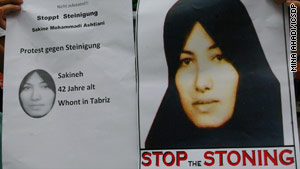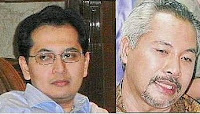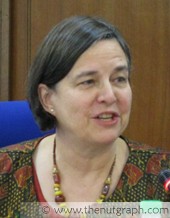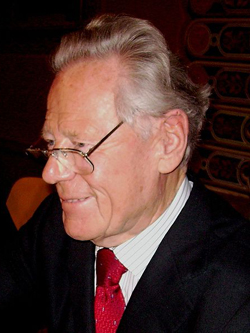
Tehran, Iran (CNN) -- The 43-year-old woman sentenced to death by stoning in Iran denounced her lawyer and said in an interview broadcast Wednesday that she knew about the plot to kill her husband but thought it was a joke.
Sakineh Mohammadi Ashtiani's lawyer said his client made those comments to state-run television "to save her life" and noted that the death sentence for murder charges related to her husband's death was commuted. The mother of two faces a death sentence for adultery.
Ashtiani's attorney, Mohammad Mostafaei, told CNN last month that his client confessed to the crime after being subjected to 99 lashes. He said she later recanted the confession and denied any wrongdoing.
In Wednesday's interview, aired on the program "20:30," Ashtiani blamed Mostafaei for publicizing her case and said she had never met him.
"I tell Mostafaei: How dare you use my name, lie in my name, say things about me that are not true," she said in a statement that was voiced over by another woman. Ashtiani's voice carries a thick Azeri accent that some Iranians may have difficulty understanding.
She added she had not wanted her family to know she was in jail.
Ashtiani acknowledged having known about the plot to kill her husband but said she had not taken it seriously at the time.
"The man entered my life and fooled me with his words and said let's kill my husband," she said. "He fooled me and said I'll do this for you, what a bad husband, I'll take care of you. He was my husband's cousin, and he said things about my husband.
"Then I realized, when I went to prison, he had a criminal record and that this was his third criminal record. And when he said we should kill my husband, I couldn't even believe him or that my husband would die. I thought he was joking, that he had lost his mind.
"When my husband's mother was at our house one day and I went to get her medicine, I saw him there with all the tools he had bought, including electrical tools, wires and gloves. Then he killed my husband by connecting him to electricity with the electrical wires. He had told me beforehand to send my kids to their grandmother's house."
The prosecutor of East Azerbaijan Province, Malek Ajdar Sharifi, then says, "The deceased was given an injection to fall asleep by his wife. Then the man arrived and put him into the bath and put two electrical lines on his body and killed the deceased."
The anchor then speculated that the Western news media, including CNN, have focused on the case to help secure the release of three American hikers seized by Iranian forces along the Iraqi border who have been in custody for more than a year.
The three Americans -- Sarah Shourd, Shane Bauer, and Josh Fattal -- were detained after they allegedly strayed across an unmarked border while hiking in Iraq's Kurdistan region.
Ashtiani's lawyer dismissed the program as a tool of the government.
" '20:30' is a program that is controlled by the intelligence services in Iran," Mostafaei told CNN in an interview in Oslo, Norway, where he has been granted asylum after fleeing Iran.
He had gone into hiding July 24, after enduring a lengthy interrogation at Iran's notorious Evin prison, the same day rallies were being held worldwide to draw attention to the Ashtiani case. He then slipped out of the country when his wife and brother-in-law were arrested. They have both since been released.
"Even IRIB [Iranian state television], they don't have any control of this program," Mostafaei said. "And the point of having this program is the character assassination of people. In this program, many reports are not real."
Mostafaei noted that his client is in prison, where she is facing a death sentence.
"It's natural that she will do whatever the authorities tell her to save her own life. They are putting a lot of pressure on her to be on television. Otherwise it wouldn't be so crucial to carry out such an act. The lawyer of a person who is facing the death penalty is the person who knows the most information about the case. He is the defending attorney. The lawyer can comment on the case, not the defendant."
He noted that Ashtiani's death sentence for killing her husband had been commuted because the victim's family forgave her.
"What is important is the sentence to stone this innocent woman to death" for adultery, he said. "She should not be stoned to death. And this is what the international community is demanding as well. This is the main subject that the Iranian state TV broadcast and the judiciary system did not address."
He disputed the assertion that they had never met. "I met her last year in Tabriz Prison," he said. "I am her legal counsel. And my goal as her attorney is to help her survive."
Another of Ashtiani's lawyers, Hootan Kian, concurred. "She was forced to say these things on television, 100 percent forced," he told CNN from Tabriz.

 By Ken Vin Lek - Free Malaysia Today
By Ken Vin Lek - Free Malaysia Today “You’re very brave. Be careful of where you walk to now, you will have to look around you, I know all your personal details, beware,” read the letter, penned in Malay.
“You’re very brave. Be careful of where you walk to now, you will have to look around you, I know all your personal details, beware,” read the letter, penned in Malay. Last week, the Oxford-trained Pua had lambasted Umno Youth and its Oxford-trained chief Khairy over the police reports, saying he would not be cowed by them.
Last week, the Oxford-trained Pua had lambasted Umno Youth and its Oxford-trained chief Khairy over the police reports, saying he would not be cowed by them.











 ef M Kulasegaran said the site, located in the heart of town, is worth at least RM20 million now, and that it is the pride of the Indian Malaysian community which makes up 15 percent of the local population.
ef M Kulasegaran said the site, located in the heart of town, is worth at least RM20 million now, and that it is the pride of the Indian Malaysian community which makes up 15 percent of the local population. egaran said the Perak government’s Indian Affairs adviser S Veerasingam (left) had reportedly said that “a settlement will be reached” after discussion with Mentri Besar Zamry Abd Kadir, who is currently abroad.
egaran said the Perak government’s Indian Affairs adviser S Veerasingam (left) had reportedly said that “a settlement will be reached” after discussion with Mentri Besar Zamry Abd Kadir, who is currently abroad. 











 By appointing a team to find a successor to the patriarch, Tata hope s to buck a national trend: family warfare
By appointing a team to find a successor to the patriarch, Tata hope s to buck a national trend: family warfare